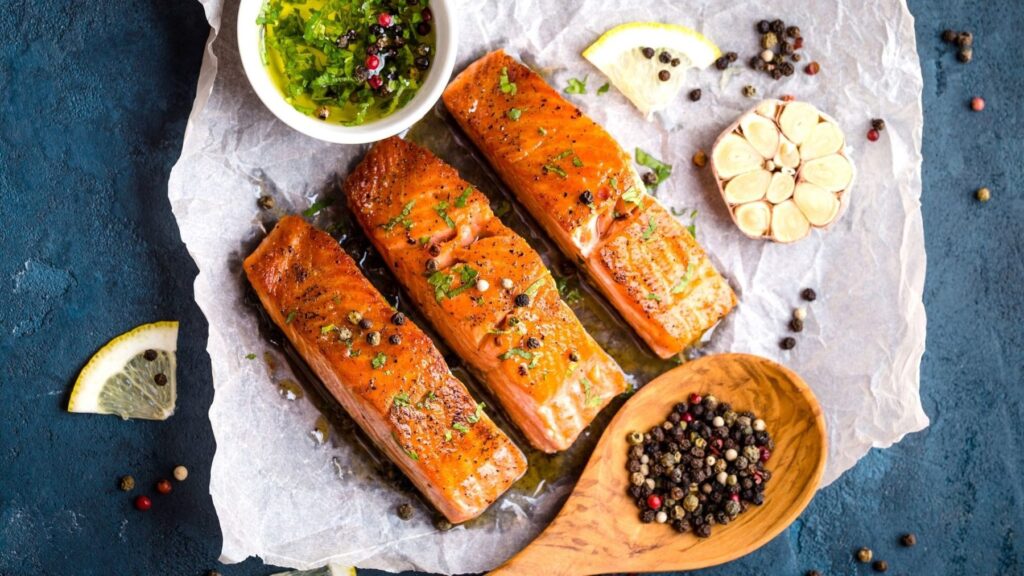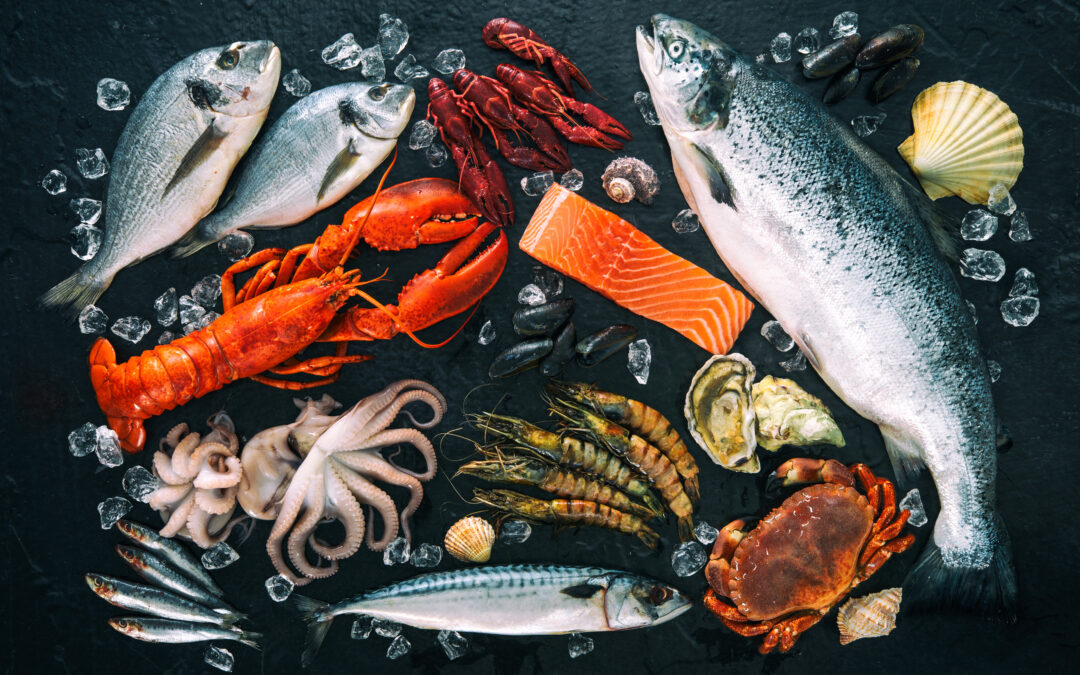Note: Fish and shellfish (crustaceans) are two of the top eight foodborne allergens and can cause severe and life-threatening allergic reactions (anaphylaxis) in some people. If you are seriously allergic to seafood the best thing is to completely avoid it. Consider speaking with a registered dietitian who can help ensure you’re getting the nutrition you need.
It’s no secret that there are benefits to eating seafood. You’ve probably also heard that some people should avoid certain types. This is true. If you’re allergic to seafood, you should avoid it altogether. If you’re at higher risk for foodborne illness, you should avoid certain types of seafood.
On the whole, most people should increase their seafood intake for optimal health. But, seafood nutrition can be confusing! If you’re not allergic to it and you have questions about it, this post is for you.
I’m going to cut through the confusion and tell you about the nutrients found in seafood (including the famous “omega-3” fats), who should avoid which types of seafood (hint: not everyone), and give you some pro tips on selecting the healthiest seafood.
Health Benefits of Eating Seafood
Seafood is a heart- and brain-healthy food and has been linked with lower levels of inflammation and reduced risks for bone fractures, and some cancers.
Heart Health
When it comes to heart health, people who eat seafood as part of a healthy eating style have lower risks for heart problems and have a smaller chance of dying from heart disease. For example, if you have high levels of triglycerides, eating seafood may help to lower it. Seafood may also protect your heart from rhythm disturbances, lower your blood pressure, and improve blood vessel function.
Brain Health
Seafood also helps the brain. People who eat seafood tend to have lower risks for stroke, depression, and Alzheimer’s disease. Intake of seafood during pregnancy is linked with better brain and vision development in the baby.
Other Health Benefits
Beyond heart and brain health, decreased risk of hip fractures, as well as colon and rectal cancers are linked to eating patterns higher in seafood.
Healthy Nutrients in Fish
Seafood is full of nutrients for good health including healthy fats, lean protein, vitamins, and minerals.
Seafood is lower in saturated fat than red meat and is widely known for its healthy unsaturated fats called omega-3 fatty acids. Deficiency in omega-3 fatty acids is linked to heart disease, mood disorders, some cancers, and arthritis. There are two main omega-3 fatty acids in seafood, including EPA (eicosapentaenoic acid) and DHA (docosahexaenoic acid). Seafood is the richest food source of EPA and DHA.
DHA is particularly good for your brain because it helps to keep it functioning efficiently. Your brain and nerves are partly made from fat, and they have a special preference for DHA. DHA deficiency is linked to serious cognitive problems, including Alzheimer’s disease. Consuming enough DHA regularly over the long-term is linked to improved ability to learn, improved memory, and a lower risk of cognitive decline.
You can also get DHA from algae and supplements. When it comes to omega-3 supplements, recent studies show that supplementing with omega-3 fatty acids may not have the same positive impacts as eating the food itself. Eating seafood as part of a healthy dietary pattern seems to have the most health benefits, however if you don’t eat seafood, you may get some heart benefits from taking a fish oil supplement.
Seafood is also an excellent source of protein and contains essential minerals like vitamin B12, iodine, iron, selenium, and zinc. It is also one of the only foods with naturally-occurring vitamin D.
Selecting Seafood with the Greatest Benefits
As you now know, seafood has many nutrients and health benefits.
The 2020-2025 Dietary Guidelines for Americans recommends the following:

** One 4-ounce serving of seafood is about the size of the palm of your hand.
Some seafood contains mercury (a toxin) that can harm the brain and nervous system. Everyone is advised to avoid fish high in mercury such as shark, swordfish, marlin, orange roughy, tilefish, bigeye tuna, and king mackerel. This concern is especially important for children and anyone who is pregnant or breastfeeding.
Opt for seafood lower in mercury:
- Shrimp
- Cod
- Sardines
- Wild Alaskan salmon
- Haddock
- Non-king mackerel (Atlantic mackerel and Pacific chub mackerel)
Examples of “oily” fish that contain higher amounts of omega-3 fatty acids and are also low in mercury are herring and trout.
Certain people should avoid eating raw seafood as they may be at higher risk for foodborne illness. This includes anyone who is pregnant, children under 5, adults over 65, and those with compromised immune systems. Raw seafood includes sushi and sashimi, raw shellfish, ceviche, seafood cooked “rare,” and smoked seafood (e.g., lox, kippered, or jerky).
When selecting fresh seafood, look for those that are properly refrigerated where the flesh looks shiny and firm, and that smell mild and not overly “fishy.” You can keep your seafood cold by picking it up toward the end of your shopping trip and putting it in the refrigerator right when you get home. If you can’t use it within two days, wrap it up tightly and freeze it.
When it comes to cooking seafood, bake or broil it whenever possible. Try to limit your intake of battered and deep-fried seafood. These preparation methods are higher in salt and the process of deep-frying can deteriorate the healthy omega-3 fats.
Final Thoughts on the Benefits of Seafood
Enjoying seafood 2-3 times per week has many benefits including heart health and brain health. Beyond its impressive links to heart and brain health, studies show that people who have a nutritious diet that includes seafood also have lower levels of inflammation and reduced risks of bone fractures and certain cancers.
Remember to choose seafood that is low in mercury and ensure that they are fresh and properly refrigerated.
Now that you know the many health benefits of eating seafood 2-3 times per week, you may be wondering where to get some recipes to try. Whether you want a quick and easy introduction to preparing seafood, some gourmet inspiration, or a review of your supplement regimen, consult a registered dietitian who can help.
Try one of our favorite fishy recipes: Pirates Booty Fish or Lemon Tuna Cakes.


